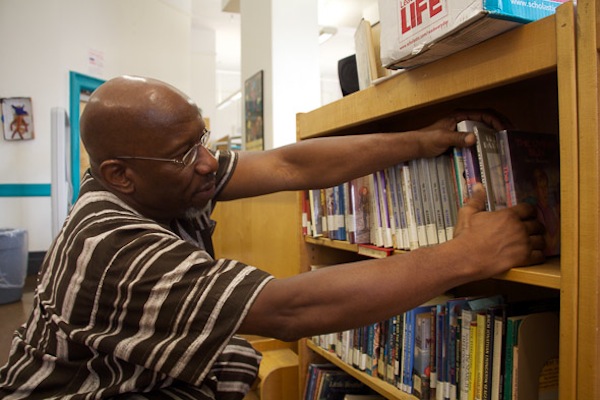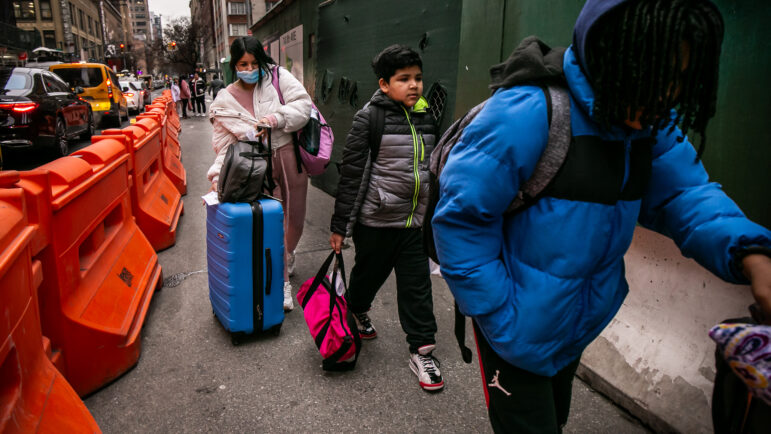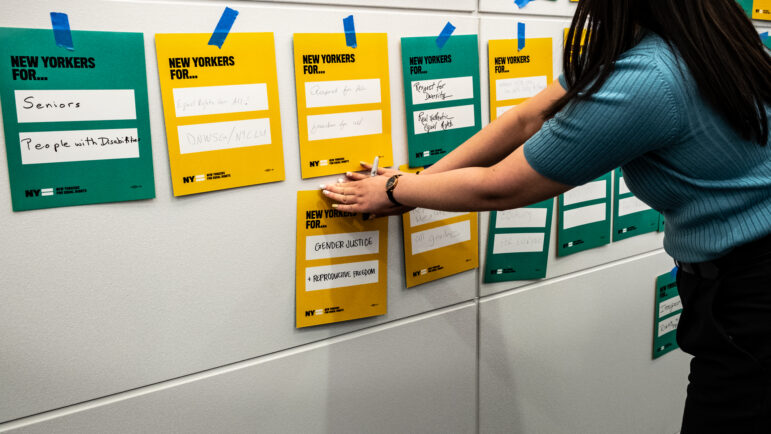
Photo by: Madeleine Cummings
Paul McIntosh of Wadleigh Secondary School in Harlem says he offers more than books to students. A safe space and a friendly ear are as important as the classics, he maintains.
Paul McIntosh of Wadleigh Secondary School in Harlem has spent the past 10 years building what he calls “an environment where young people can explore all dimensions of the human experience.” He recruits big-name guests for his popular speaker series, publishes an annual poetry anthology, even acts as an unofficial guidance counselor to any student who reaches out to him for help.
For those struggling with school, personal problems, even thoughts of suicide, the school library is one place they can go to find solace. Whether it’s a transgendered student being bullied or a shy writer trying to find his voice, McIntosh says kids have, for years, turned to him for support.
While McIntosh isn’t worried about losing his job, librarians across the city fear for their profession’s future. The state has rules stipulating the presence of certified librarians in middle and high schools of certain sizes, but for the past few years, the DOE has failed to abide by the regulation and for several years the number of certified librarians in schools has declined. As of May, the department employed 333 certified school librarians who serve a fraction of the city’s schools. Four years ago, that number was 399.
In May, at a City Council committee hearing on the availability of school librarians, Gregg Betheil, an executive director at the DOE, acknowledged there was work to be done. “We know as a system that we are not fully compliant,” he said in his testimony, referring to the board’s violation of the state staffing rules.
On August 9, the DOE requested a variance from the state, asking official permission to offer fewer librarians in schools. While the DOE says it recognizes librarians’ value, in the face of fiscal challenges and technological changes the department is looking for alternative ways to provide students with library services. In place of hiring certified librarians, schools could train teachers to offer the same services, bring in parent volunteers or have librarians circulate between schools.
Meanwhile, elementary schools are exempt from the regulation altogether. Some elementary school libraries are staffed by teachers or librarians without certification. Some even go without. In Central Harlem, for example, P.S. 197, P.S. 200, and P.S. 242, all lack librarians.
Whether a school has a librarian – certified or not – is often up to the principal. Such is the case at Central Harlem’s P.S. 175, where Principal Cheryl McClendon has chosen not only to keep her library staffed but also to reach out for library improvement grants.
Sharon Robinson, who works in P.S. 175’s library, says that since the space received a renovation a few years ago, it has become a “hub of the school” where children come in regularly, families meet for reading nights, and artists come to host literacy workshops.
According to McIntosh, introducing students to successful individuals – famous doctors, engineers, poets, and artists – inspires them to read more on subjects they may not have considered. “Once that inspiration is there I can put them in contact with a book or put them in contact with some opportunities which will help them to fulfill their aspirations,” he says. “But a librarian has to do that.”
The DOE is advocating the use of classroom libraries as one way of insuring students aren’t far from the books and technology they need. But not all are convinced of the classroom library’s potential.
“The idea that a shelf full of a books somehow replaces a librarian is wrong,” says Christian, Zabriskie, Executive Director of Urban Librarians Unite, a professional group that supports librarianship in urban settings. “If I’m exploring things about, say, my sexuality, drug issues, health issues, I can’t grab those books in front of my peers,” he adds. Zabriskie’s own middle school librarian had a significant impact on his life by supporting him when he was being bullied and teaching him how to stand up for others.
Chris Davis, whose daughter Eeja attends Teachers College Community School, says regardless of whether a school has a librarian, kids can still access books and services at local public libraries.
Still, some parents, and students, argue that school libraries should always be staffed.
“We have a full-time librarian,” Jada Mills, 11, says proudly of her Harlem elementary school, P.S. 76. “If we didn’t, I would ask the principal to put one in the school.”








